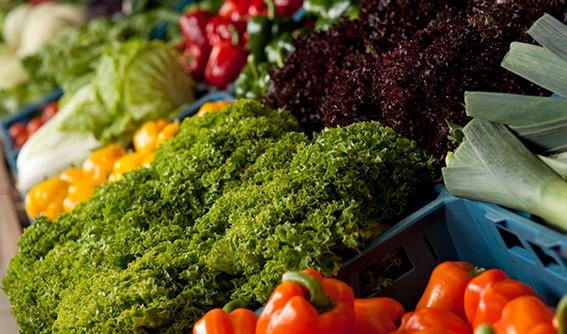Whether it’s about regional or fair trade food products, health or the impact on the environment, sustainability in nutrition is currently a heavily discussed topic. On the one hand, this topic involves being able to promote and maintain our health by eating good-quality and healthy foods whilst, on the other hand, also paying attention to what effects our eating habits have on other people, the environment, the economy and the next generations – our children. Although this issue is therefore a complex interplay of many factors, there are a few simple guidelines for everyday life.
Sustainability in all these areas starts with us making sure we adhere to a so-called “plant-based diversified diet”. This means eating predominantly plant-based foods and consuming animal products in lower quantities (e.g. meat, sausage, egg, milk products). The emphasis here is on lower amounts of meat and sausage: this should be less than 500 g per week, which roughly corresponds to 3 portions. Conversely, a larger amount of fruit and vegetables, grains, pulses (e.g. kidney beans, lentils, chickpeas) and nuts should be consumed. Approximately five handfuls of fruit and vegetables should be eaten each day (c. 600 g) and grains are best consumed in the form of whole grain products. In addition to many nutrients, plant-based food sources also provide fibre and secondary plant substances. This type of nutrition makes a valuable contribution to your health and lowers the risk of developing various diseases including cancer. When we consume less animal-based foods, this consequently means we also tend to eat less saturated fatty acids. Although the amount of saturated fatty acids probably has no influence on the risk of developing cancer, it is still desirable to lower the intake as an excess of saturated fatty acids leads to a higher risk of dyslipidemia (high cholesterol).
A predominantly plant-based diet is not only advantageous for our own health – it is also environmentally friendly, reduces the burden on the healthcare system and makes a contribution to a fairer global distribution of food. Furthermore, reducing consumption of meat also saves money which can then be used for buying high-quality, fair trade products which comply with humane animal welfare standards. This can, for example, be achieved by opting for regional organic products.
Further possibilities to promote sustainability in nutrition:
- When shopping, try to buy:
- regional and seasonal foods
e.g. with the assistance of a seasonal calendar, also available as app;
e.g. by looking out for “regional” labelling. - fresh products and products which have not been heavily processed (e.g. potatoes instead of chips, try to prepare your own dishes instead of using ready-made products)
- ecologically-cultivated (“organic”) foods
- fair trade products
- regional and seasonal foods
- Cycle or take the bus or train to the shops instead of using a car
- Ensure that less food ends up being thrown away
- Reduce the amount of food packaging you accumulate
Sources:
Broschüre „Erläuterungen zur Plakatausstellung Nachhaltige Ernährung Essen für die Zukunft“. Bayerisches Staatsministerium für Ernährung, Landwirtschaft und Forsten (2011)
Ernährung nach den vier Dimensionen – Wechselwirkungen zwischen Ernährung und Umwelt, Wirtschaft, Gesellschaft und Gesundheit. Karl von Koerber und Jürgen Kretschmer, Ernährung & Medizin (2006); 21: 178–185.
DGE-Beratungs-Standards. Deutsche Gesellschaft für Ernährung (2013)
DGE-Leitlinie – Fettzufuhr und Prävention von Krebskrankheiten. Deutsche Gesellschaft für Ernährung (2015)
ZUSAMMENFASSUNG: Ernährung, körperliche Aktivität und Krebsprävention: Eine globale Perspektive. World Cancer Research Fund (WCRF) (2007)
Links:
Nachhaltige Ernährung – regional essen, saisonal einkaufen (http://www.stmelf.bayern.de/ernaehrung/007760/index.php). Bayerisches Staatsministerium für Ernährung, Landwirtschaft und Forsten (08/2015)
Saisonkalender (https://www.in-form.de/buergerportal/in-form-erleben/saisonkalender/obst-und-gemuese-monat-fuer-monat.html). In Form – Deutschlands Initiative für gesunde Ernährung und mehr Bewegung, Bundesanstalt für Landwirtschaft und Ernährung (08/2015)

Pingback: Sausage, red meat and the uncertainty about cancer-promoting substances | YOU ARE WHAT YOU EAT! | YOU ARE WHAT YOU EAT!